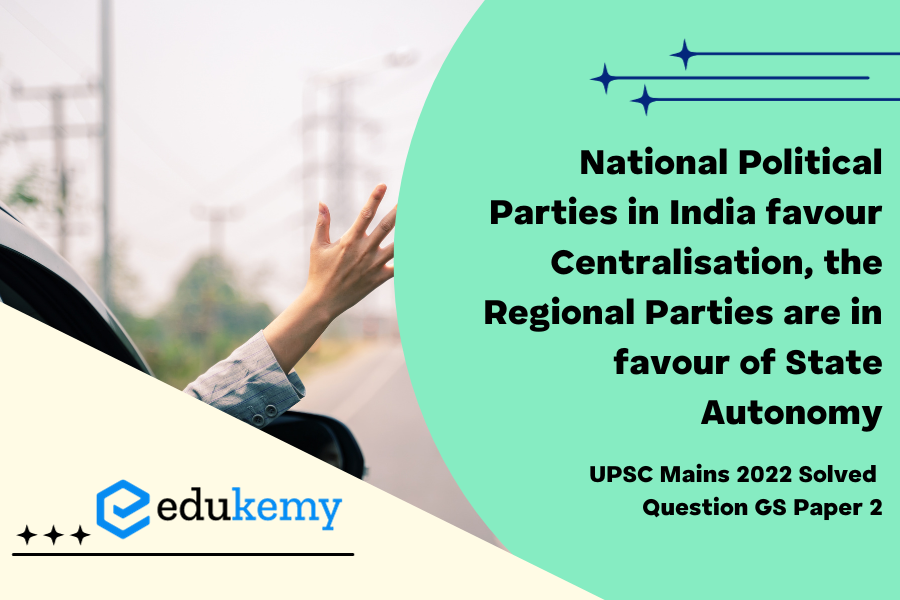In the complex tapestry of Indian politics, a dichotomy emerges between national and regional parties. National entities lean towards centralization, emphasizing a unified approach, while regional counterparts advocate for state autonomy, asserting regional interests. This dynamic reflects the ongoing struggle to balance centralized governance with the diverse needs of India’s culturally rich and geographically vast regions.
UPSC Mains General Studies Paper – 2 Mains 2022
UPSC Mains Civil Services IAS Exam Question Paper – 2022
Contents
Approach
- Start with explaining the key word “centralisation” as respect to the Indian political parties.
- Discuss on the National Parties favour Centralisation and Regional Parties favour State Autonomy.
- Way forward / conclusion.
Introduction
- Centralisation refers to the concentration of decision-making power and authority at a central unit, often with the aim of bringing uniformity to the process. It means that decisions are made by a central authority or entity, rather than by individual units or local governments. State autonomy refers to the degree of control that a state or local government has over its own resources and decision-making. This can include control over finances, infrastructure, and policies. The Election Symbols (Reservation and Allotment) Order, 1968 specifies the conditions for political parties to be recognized as national or state parties.
Body
- In India, there has been a long-standing tussle between national and regional political parties over issues related to development, representation at forums, and finances. Regional parties often advocate for greater state autonomy, while national parties tend to favour centralization. It can drive according to the National Parties favour Centralization and Regional Parties favour State Autonomy.
National Parties favour Centralization:
- Political Reasons: National parties, due to their larger voter base and national presence, tend to have a different set of agendas and priorities compared to regional parties. National parties tend to focus on issues that are relevant to the entire country, such as economic policies, national security, foreign policy, etc. On the other hand, regional parties tend to focus on issues that are specific to their respective states or regions, such as language, culture, development, etc.
- Financial Reasons: National parties favour centralization of financial control, including the control of the annual budget and the distribution of funds through the recommendations of the Finance Commission. This can be advantageous for national parties in terms of projecting a strong and consistent image to voters, as well as in gaining support from businesses and other interest groups that may be looking for a more stable and predictable policy environment.
- Administrative Reasons: Even though the state governments have significant autonomy, the central government still plays a dominant role in many areas, such as finance, planning, and development. National parties, with their pan-India presence and larger financial resources, are better equipped to deal with the demands of such issues and hence have a more dominant position in shaping policies and programmers at the national level. the Governor functions solely as an agent of the Centre and controls unconstitutional developments including law and order in states.

Regional Parties favour State Autonomy:
- Political & Social Reasons: Regional parties often advocate for state autonomy as they represent the interests of their respective states and regions. These parties often have a strong regional presence and appeal to a specific voter base, which may be based on caste, community, or language. They use social engineering techniques to attract such voters and ensure their support. Examples of regional parties advocating for state autonomy can be seen in the passing of the Bill against the National Eligibility cum Entrance Test (NEET) by the Dravida Mun Netra Kazhagam (DMK) in Tamil Nadu and the demand for a caste-based census by the Rastriya Janata Dal (RJD) and Janata Dal United (JDU) in Bihar.
- Financial Reasons: Regional parties have often demanded special status for their states, which can bring in more funds and avenues for growth. The devolution of finance by the central government is often tied with conditionalities and centrally sponsored schemes, which can sometimes take away the autonomy of the state governments. This has led to some states like West Bengal, Telangana, and Odisha withdrawing from certain centrally sponsored schemes like the Pradhan Mantri Jan Arogya Yojana (PMJAY).
- Administrative Reasons: The central government, which is often led by national parties, has been accused of misusing concurrent powers to interfere in state matters. The misuse of central agencies like CBI, ED, Income Tax, and the politicisation of the Governor’s office are some of the examples of this interference. In some cases, the central government has used these agencies to target political opponents or to further their own political agenda. This has led to accusations of undermining the federal structure of India and encroaching on the powers of the states. Regional parties have often been at the forefront of raising these issues and demanding greater autonomy for the states.
Conclusion
- Thus, both National parties and regional parties have their own strengths and priorities, and their co-existence ensures a balance of power between the Centre and the states in India’s quasi-federal political system. This creates a dynamic political landscape and provides a platform for diverse viewpoints and interests to be represented in the Indian Parliament.
In case you still have your doubts, contact us on 8792740517.
For UPSC Prelims Resources, Click here
For Daily Updates and Study Material:
Join our Telegram Channel – Edukemy for IAS
- 1. Learn through Videos – here
- 2. Be Exam Ready by Practicing Daily MCQs – here
- 3. Daily Newsletter – Get all your Current Affairs Covered – here
- 4. Mains Answer Writing Practice – here


